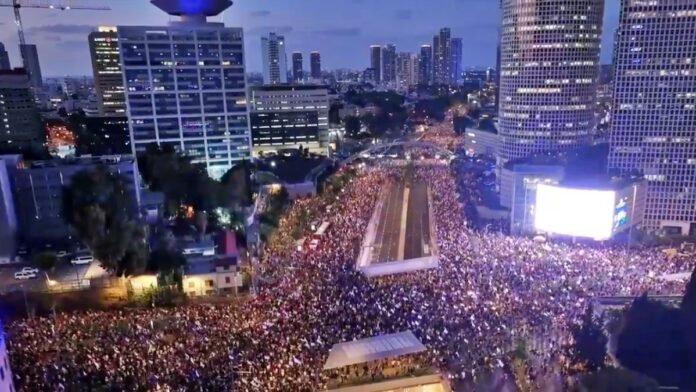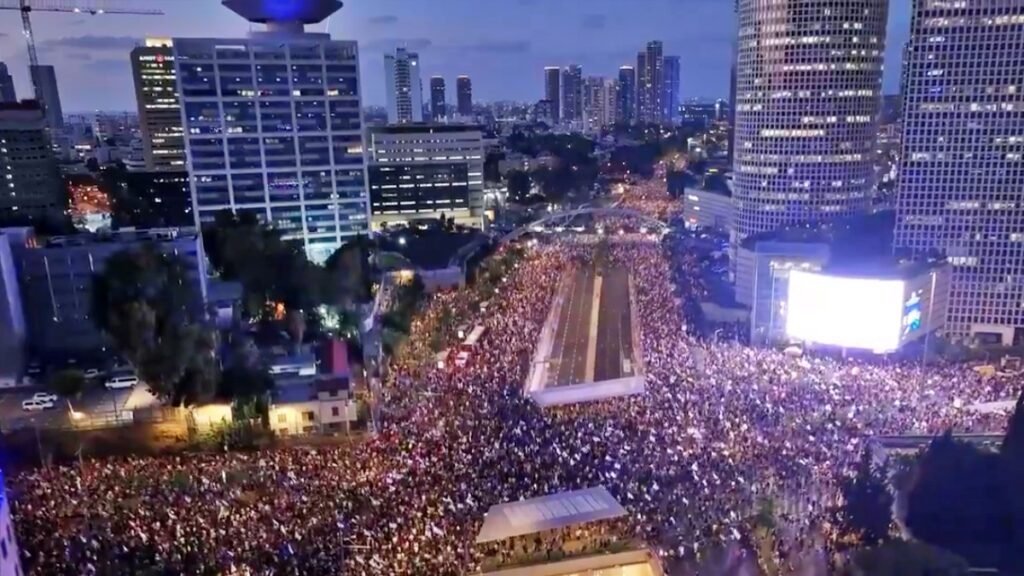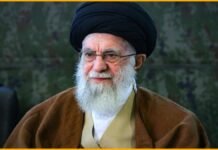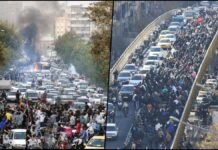
Tel Aviv: In an unprecedented wave of protests, hundreds of thousands of Israelis took to the streets on Sunday, fueled by grief and anger over the death of six hostages in Gaza. The mass mobilization, one of the largest in the country’s recent history, underscores the mounting frustration with the Israeli government’s inability to secure a ceasefire that would free the remaining captives.
The protests saw an estimated 300,000 people gather in Tel Aviv, with an additional 200,000 participating in demonstrations across the nation. In Jerusalem, protesters blocked key streets and converged outside Prime Minister Benjamin Netanyahu’s residence, demanding immediate action to secure the release of the remaining 101 hostages. The atmosphere was charged with emotion as demonstrators waved flags bearing the images of the slain hostages, turning the streets into a sea of somber defiance.
Dramatic footage from Tel Aviv showed the city’s main highway overwhelmed with protesters, their resolve palpable. In response, police deployed water cannons to disperse crowds that had blocked major roads, resulting in at least 29 arrests. In a significant show of solidarity, the country’s labor leaders called for a one-day general strike on Monday, amplifying the pressure on Netanyahu’s government.
The Israeli military, in a somber announcement on Sunday, revealed that the bodies of the six hostages Carmel Gat, Hersh Goldberg-Polin, Eden Yerushalmi, Alexander Lobanov, Almog Sarusi, and Ori Danino were recovered from a tunnel in the southern Gaza city of Rafah. A forensic examination confirmed that the hostages were “murdered by Hamas terrorists with multiple shots at close range” 48-72 hours before their recovery, according to a spokesperson for the Israeli health ministry.
Prime Minister Netanyahu, increasingly isolated and facing growing calls to end nearly 11 months of war, vowed that Israel would not rest until those responsible for the hostages’ deaths were brought to justice. However, his words did little to quell the rising tide of dissent, as critics accuse his administration of failing to protect Israeli citizens.
The ongoing conflict, which began after Hamas and other militant groups launched deadly attacks on Israel on October 7, has seen over 1,200 Israelis killed and around 250 taken hostage. In response, Israel has launched a relentless offensive against Gaza, reducing large parts of the enclave—home to 2.3 million people—to rubble. According to the Gaza health ministry, at least 40,738 Palestinians have been killed in the ongoing military campaign, with displaced residents enduring dire conditions, including a severe shortage of food and shelter.
As public outrage intensifies, the head of Israel’s trades union federation, Arnon Bar-David, called for a general strike on Monday, hoping to force the government’s hand in securing a ceasefire deal. Defense Minister Yoav Gallant, who has frequently clashed with Netanyahu, also urged for an agreement to be reached, while opposition leader and former Prime Minister Yair Lapid joined the protests in Tel Aviv, calling for nationwide participation.
The emotional toll of the conflict was further highlighted when Netanyahu reached out to the family of Alexander Lobanov, one of the recovered hostages, offering an apology and expressing “deep sorrow.” However, the family of Carmel Gat refused to speak with the prime minister, instead urging all Israelis to join the protests. “Take to the streets and shut down the country until everyone returns. They can still be saved,” Gat’s cousin, Gil Dickmann, passionately appealed on social media.

Despite months of stop-start negotiations mediated by the United States, Qatar, and Egypt, a ceasefire deal remains elusive. Increased U.S. pressure and repeated diplomatic efforts have yet to yield a breakthrough. As a temporary measure, Israel and Hamas have agreed to pause fighting in certain areas of Gaza for at least eight hours daily from Sunday to Tuesday, allowing the vaccination of 640,000 children against polio. However, with emotions running high and trust in the government waning, the situation remains volatile, with the prospect of further unrest looming large.




















































